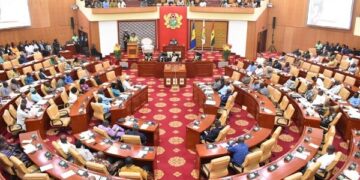The Institute of Economic Affairs (IEA) wants the government to collaborate with the Bank of Ghana to find solution to the rising cost of living in the country.
The IEA has expressed concern about the soaring inflation figures, which is mainly contributing to the high cost of living.
Speaking to Kwaku Nhyira-Addo on the back of the presentation of the mid-year budget review on The Asaase Breakfast Show, the head of research at IEA, Dr John Kwakye on Wednesday said the government must find ways to drive inflation down.
“Inflation, I don’t know whether the figure quoted in the minister’s statement is correct, because he is talking like we expect inflation to remain at 28.5% by the close of the year. June was 29.8%.
“So, are we saying that we will not be able to bring inflation down in the next six months, and we have to cope with this level of inflation for the rest of the year, I don’t know,” Kwakye said.
“What are we doing about fuel prices and the inflation rate? There should be concerted effort to address these issues and I did not see that in the review,” he said. “What efforts are being made with the Bank of Ghana to bring the cost of living down?”
Inflation rate for June 2022 hits 29.8%
Meanwhile, the national year-on-year inflation rate was 29.8% in June 2022, which is 2.2 percentage points higher than the 27.6% recorded in May 2022, the Ghana Statistical Service (GSS) has said.
This means that in the month of June 2022 the general price level was 29.8% higher than in June 2021.
According to the GSS, the month-on-month inflation between May 2022 and June 2022 was 3.0%
On a year-on-year basis, the difference between food inflation (30.7%) and non-food (29.1%) was 1.6 percentage points.
On a month-on-month basis, non-food inflation recorded a higher rate of 3.6% relative to food (2.3%), leading to a 1.3 percentage point difference.
The percentage point increase in non-food inflation (3.4%) between May and June 2022 is higher than food inflation (0.6%).
The percentage point difference between inflation for imported items (31.3%) and locally domestic items (29.2%) was 2.1%.
Transport (41.6%), Household Equipment and Maintenance (39.6%), Housing, Water, Electricity and Gas (38.4%), Personal Care and Miscellaneous Goods (31.7%), Recreation, Sports and Culture (31.3%) and Clothing and Footwear (3.3%)} recorded inflation rates higher than the national average (3.0%).
Food and non-alcoholic beverages (30.7%)} out of the 13 divisions recorded inflation rates higher than the national average (29.8%).
Regional breakdown
Central Region recorded the highest food inflation (40.9%) and Eastern Region, had the highest non-food inflation (35.5%).
The Eastern Region recorded the overall highest inflation (35.8%) followed by Western Region (33.9%) and Central Region (31.6%). While Greater Accra recorded the fourth-highest rate of inflation 30.9%.





















































































